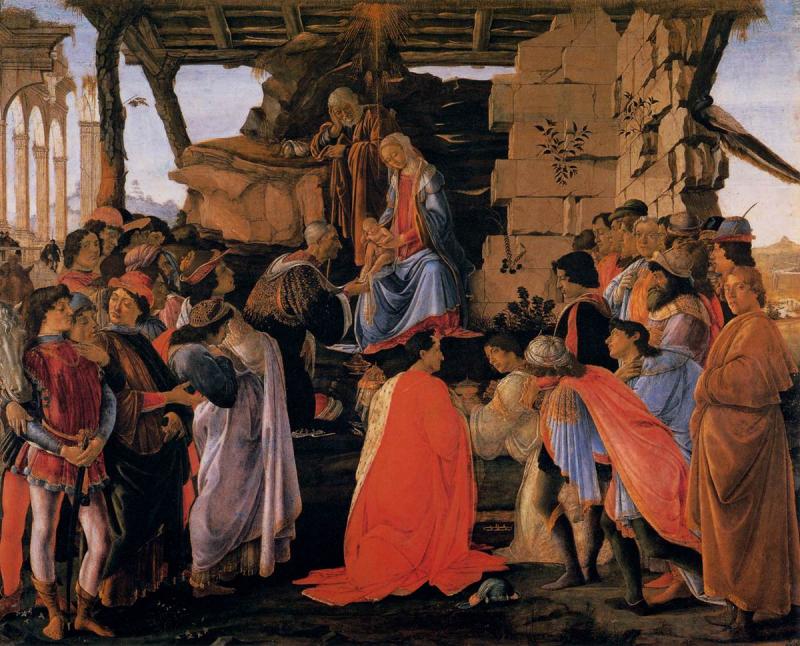BBC Singers, BBCSO, Pons, Barbican | reviews, news & interviews
BBC Singers, BBCSO, Pons, Barbican
BBC Singers, BBCSO, Pons, Barbican
Blue skies from Respighi and Strauss, seasonal mystery from Brett Dean

Had the BBC Symphony Orchestra been at full stretch, rather than in the neoclassical and otherwise selective formations of last night’s concert, it might have outnumbered the live audience. Perhaps I exaggerate, but not much; this was never going to be a box-office hit. A big-name soloist might have made a difference.
The Australian composer and former Berlin Philharmonic viola player is the BBCSO’s new Artist in Residence. It’s not a bad choice, if the four-movement The Annunciation, set to epiphanic poems by compatriot Graeme William Ellis and composed for Leipzig’s Thomanerchor, is a star in the east of things to come. I’ve not been left with huge impressions by previous works, but this one seems to have more obvious direction, thanks to the text, and the textures are always absorbing.
 The “Star out of Jacob” announced by Numbers in Dean’s Prelude (the composer pictured right by Pawel Kopczynski) seems to rise out of the pond in which Berg’s Wozzeck drowned: key to the precisely-scored murk here is the sound of three clarinets, complemented by the same number of horns, violas and cellos, plus two basses and harp. Dean’s own instrument multiplied projects anguished activity. The choir – the BBC Singers in top, luminous form - anchors the Three Kings’ arrival at the Jerusalem stable with consonant harmonies and unfolds riches with high-line starbursts in the final Incantation.
The “Star out of Jacob” announced by Numbers in Dean’s Prelude (the composer pictured right by Pawel Kopczynski) seems to rise out of the pond in which Berg’s Wozzeck drowned: key to the precisely-scored murk here is the sound of three clarinets, complemented by the same number of horns, violas and cellos, plus two basses and harp. Dean’s own instrument multiplied projects anguished activity. The choir – the BBC Singers in top, luminous form - anchors the Three Kings’ arrival at the Jerusalem stable with consonant harmonies and unfolds riches with high-line starbursts in the final Incantation.
Dean’s realization of what the poems convey and their execution under conductor Josep Pons are both impeccable; but beware waxing lyrical about “sound world” – it usually means that the actual substance is less than wonderful, and on a first hearing that’s my impression (scores were being shelled out, but I didn’t get one).
Ideas came light and fast in the flanking gems of the evening. Respighi’s Botticelli pictures wrap the ancient airs and dances he would later treat more chastely in typically brilliant orchestration: Vivaldian flares for violins to usher in "La primavera" (Spring), discreet percussion, celesta and piano splashes at the heart of another Adoration of the Magi and the bright air around Venus rising from the sea precisely but still magically etched under Pons’s easy direction around Debussyan wind solos.
It’s hard to believe that all this comes with no heavy brass and timpani, so full is the impression. We hear the brilliance of the opening to The Pines of Rome and orientalisms anticipating the cinemascope east of the ballet Belkis, Queen of Sheba: both Proms hits earlier in the year, so this made a satisfying last visit to Respighi’s colourful world (more appropriate still would have been the Sinfonia Drammatica begun in horror at the First World War in 1914).
 I’d pinned down solo-wind credit to the dialogues of Daniel Pailthorpe’s magical flute and Graham Sheen’s bassoon creating the dream-world of Respighi’s sea-borne Venus, but accolades accumulated as Strauss throws every player a choice bone in his incidental music to Hofmannsthal’s adaptation of Le bourgeois gentilhomme – the “little Molière project” of 1912 which grew to embrace the opera we know as Ariadne auf Naxos, only to be refashioned without the opera and more set pieces for comic Monsieur Jourdain’s discomforture in 1918. Oboist Richard Simpson lilted the Overture’s Sicilienne with surprising muscle; James Burke audaciously freed up the birdsong from the barline when the concluding banquet of culinary delights prompting a parallel feast of Straussian quotation served up a dish of quails.
I’d pinned down solo-wind credit to the dialogues of Daniel Pailthorpe’s magical flute and Graham Sheen’s bassoon creating the dream-world of Respighi’s sea-borne Venus, but accolades accumulated as Strauss throws every player a choice bone in his incidental music to Hofmannsthal’s adaptation of Le bourgeois gentilhomme – the “little Molière project” of 1912 which grew to embrace the opera we know as Ariadne auf Naxos, only to be refashioned without the opera and more set pieces for comic Monsieur Jourdain’s discomforture in 1918. Oboist Richard Simpson lilted the Overture’s Sicilienne with surprising muscle; James Burke audaciously freed up the birdsong from the barline when the concluding banquet of culinary delights prompting a parallel feast of Straussian quotation served up a dish of quails.
Neoclassical way before the term was slapped on Stravinsky in the late 1920s, and five years before Prokofiev’s “Classical” Symphony, the Bourgeois gentilhomme music's freedom parallels Stravinsky’s later achievements in that we think we’re in the late 17th and early 18th centuries – especially in the central movements taken directly from Lully, Molière's original composer – only to veer into the early 20th with the riches of the 10-minute dinner. If anything, Pons over-romanticised passages like the deliciously sentimental cello solo to accompany the leg of mutton – bleating horn sheep around the instrument of Strauss’s Don Quixote – but that was fine given the high-lying sweetness of Susan Monks’s playing.It was a joy to watch how Strauss distributes the selective string parts especially - something we could have done with seeing on the previous evening when in equally delicious fare by Lully's superior Rameau William Christie's Les Arts Florissants were all but hidden at the back of the Barbican platform.
Most remarkable was the second featured Australian in the programme, guest leader Natalie Chee (pictured above), as the polonaise-dancing tailor: on the umpteen recordings I own of this lovable work, no violinist plays with such perfect intonation and spirit. So if anyone should get the vacant leader post, it has to be her. Pons may have imposed a slightly heavy view on the featherlight minuets and gavottes, but there was surprising sensuousness in the final waltz of the kitchen boy, and it never stopped the BBCSO sounding like an army of generals. No London orchestra is on better form at the moment
rating
Share this article
The future of Arts Journalism
You can stop theartsdesk.com closing!
We urgently need financing to survive. Our fundraising drive has thus far raised £33,000 but we need to reach £100,000 or we will be forced to close. Please contribute here: https://gofund.me/c3f6033d
And if you can forward this information to anyone who might assist, we’d be grateful.

Subscribe to theartsdesk.com
Thank you for continuing to read our work on theartsdesk.com. For unlimited access to every article in its entirety, including our archive of more than 15,000 pieces, we're asking for £5 per month or £40 per year. We feel it's a very good deal, and hope you do too.
To take a subscription now simply click here.
And if you're looking for that extra gift for a friend or family member, why not treat them to a theartsdesk.com gift subscription?
more Classical music
 Donohoe, RPO, Brabbins, Cadogan Hall review - rarely heard British piano concerto
Welcome chance to hear a Bliss rarity alongside better-known British classics
Donohoe, RPO, Brabbins, Cadogan Hall review - rarely heard British piano concerto
Welcome chance to hear a Bliss rarity alongside better-known British classics
 London Choral Sinfonia, Waldron, Smith Square Hall review - contemporary choral classics alongside an ambitious premiere
An impassioned response to the climate crisis was slightly hamstrung by its text
London Choral Sinfonia, Waldron, Smith Square Hall review - contemporary choral classics alongside an ambitious premiere
An impassioned response to the climate crisis was slightly hamstrung by its text
 Goldberg Variations, Ólafsson, Wigmore Hall review - Bach in the shadow of Beethoven
Late changes, and new dramas, from the Icelandic superstar
Goldberg Variations, Ólafsson, Wigmore Hall review - Bach in the shadow of Beethoven
Late changes, and new dramas, from the Icelandic superstar
 Mahler's Ninth, BBC Philharmonic, Gamzou, Bridgewater Hall, Manchester review - vision and intensity
A composer-conductor interprets the last completed symphony in breathtaking style
Mahler's Ninth, BBC Philharmonic, Gamzou, Bridgewater Hall, Manchester review - vision and intensity
A composer-conductor interprets the last completed symphony in breathtaking style
 St Matthew Passion, Dunedin Consort, Butt, Queen’s Hall, Edinburgh review - life, meaning and depth
Annual Scottish airing is crowned by grounded conducting and Ashley Riches’ Christ
St Matthew Passion, Dunedin Consort, Butt, Queen’s Hall, Edinburgh review - life, meaning and depth
Annual Scottish airing is crowned by grounded conducting and Ashley Riches’ Christ
 St Matthew Passion, Irish Baroque Orchestra, Whelan, St Patrick’s Cathedral, Dublin review - the heights rescaled
Helen Charlston and Nicholas Mulroy join the lineup in the best Bach anywhere
St Matthew Passion, Irish Baroque Orchestra, Whelan, St Patrick’s Cathedral, Dublin review - the heights rescaled
Helen Charlston and Nicholas Mulroy join the lineup in the best Bach anywhere
 Kraggerud, Irish Chamber Orchestra, RIAM Dublin review - stomping, dancing, magical Vivaldi plus
Norwegian violinist and composer gives a perfect programme with vivacious accomplices
Kraggerud, Irish Chamber Orchestra, RIAM Dublin review - stomping, dancing, magical Vivaldi plus
Norwegian violinist and composer gives a perfect programme with vivacious accomplices
 Small, Hallé, Wong, Bridgewater Hall, Manchester review - return to Shostakovich’s ambiguous triumphalism
Illumination from a conductor with his own signature
Small, Hallé, Wong, Bridgewater Hall, Manchester review - return to Shostakovich’s ambiguous triumphalism
Illumination from a conductor with his own signature
 LSO, Noseda, Barbican review - Half Six shake-up
Principal guest conductor is adrenalin-charged in presentation of a Prokofiev monster
LSO, Noseda, Barbican review - Half Six shake-up
Principal guest conductor is adrenalin-charged in presentation of a Prokofiev monster
 Frang, LPO, Jurowski, RFH review - every beauty revealed
Schumann rarity equals Beethoven and Schubert in perfectly executed programme
Frang, LPO, Jurowski, RFH review - every beauty revealed
Schumann rarity equals Beethoven and Schubert in perfectly executed programme
 Levit, Sternath, Wigmore Hall review - pushing the boundaries in Prokofiev and Shostakovich
Master pianist shines the spotlight on star protégé in another unique programme
Levit, Sternath, Wigmore Hall review - pushing the boundaries in Prokofiev and Shostakovich
Master pianist shines the spotlight on star protégé in another unique programme
 Classical CDs: Big bands, beasts and birdcalls
Italian songs, Viennese chamber music and an enterprising guitar quartet
Classical CDs: Big bands, beasts and birdcalls
Italian songs, Viennese chamber music and an enterprising guitar quartet

Add comment